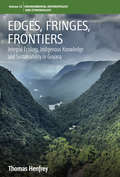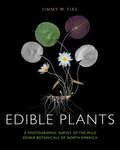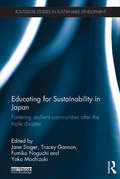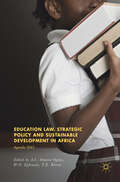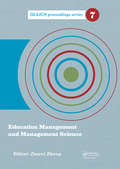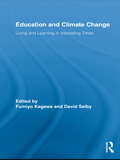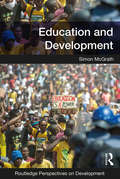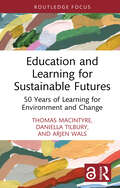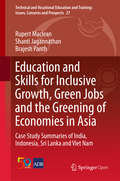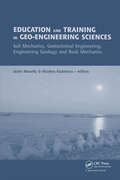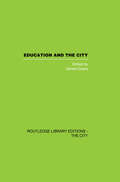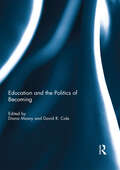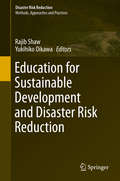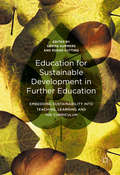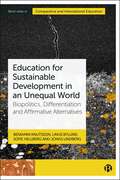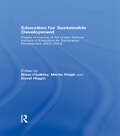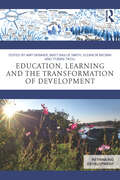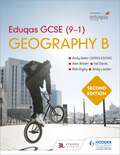- Table View
- List View
Edges, Fringes, Frontiers: Integral Ecology, Indigenous Knowledge and Sustainability in Guyana (Environmental Anthropology and Ethnobiology #23)
by Thomas HenfreyBased on an ethnographic account of subsistence use of Amazonian forests by Wapishana people in Guyana, Edges, Frontiers, Fringes examines the social, cultural and behavioral bases for sustainability and resilience in indigenous resource use. Developing an original framework for holistic analysis, it demonstrates that flexible interplay among multiple modes of environmental understanding and decision-making allows the Wapishana to navigate social-ecological complexity successfully in ways that reconcile short-term material needs with long-term maintenance and enhancement of the resource base.
Ediacaran-Paleozoic Rock Units of Egypt: Their Correlation with Adjacent Countries and Their Depositional Environments (Earth and Environmental Sciences Library)
by Mohamed Abdel KhalifaThis book presents the following geological contributions in Ediacaran and Paleozoic rocks. 1) It introduces four new rock units for the first time, the Ediacaran El Urf Formation (volcanoclastic sediments in the central Eastern Desert), the Ediacaran Abu Haswa Formation (stromatolitic dolostone in southwestern Sinai), the Early Permian Wadi Dome Formation (mixed clastics and carbonates in the west of Suez Gulf) and the Early Permian Misawag Formation (in the subsurface, northwestern Desert), 2) making correlation of the Ediacaran rock units with the corresponding rock units in Libya, Jordan, Iraq and Saudi Arabia, 3) linking the exposed Paleozoic rock units with their equivalent rock units in subsurface in northwestern desert, 4) correlating the Paleozoic rock units with the equivalent rock units in adjacent countries, e. g. Libya, Jordan, Iraq and Saudi Arabia, 5) manifesting the possible depositional environments of the Ediacaran and Paleozoic rock units. Additionally, it offers an important unique geological information about the Ediacaran and Paleozoic rock units in Egypt. It unifies the nomenclature of Paleozoic rock units that take numerous names for the same geological time. It obsoletes the formation names that do not follow the rules of the North American stratigraphic code (1983) for rock units’ nomenclature. It provides the target audience illustrations, e.g. field photographs for the exposed rock units that save efforts and time for audience (undergraduate, post-graduate, researchers and professional) to reach to the original localities of each rock units. It provides the audience with schematic diagrams that exhibit the link between the exposed and subsurface rock units all over the Egyptian territory. It describes the following topics of each rock unit: definition, stratigraphic contact, lithological characteristics, faunal and floral associations that are used for the identification of the possible age, correlation with corresponding rock units in adjacent countries, e.g. Libya, Jordan, Iraq and Saudi Arabia and the possible depositional environments for each rock units. The book is a fundamental source of an updated version of the information in the field to the undergraduate, graduate, researchers, professional, practitioners and policy planning elsewhere.
Edible Alliums: Botany, Production and Uses (Botany, Production and Uses)
by Brian Thomas Haim D. RabinowitchAllium crops include more than 30 species, many of which (for e.g. onions, shallots, garlic, leeks, bunching onions, and chives) are of economic importance. Bulb onions rank second only to tomatoes in terms of global production. Alliums are farmed and harvested in a range of climatic conditions worldwide, forming important parts of local diets. This book provides a comprehensive review of major and minor Allium crops from scientific and horticultural perspectives. It broadly covers modern biology (including genetics and breeding), propagation, production, processing, and nutritional and health benefits. Edible Alliums contains coverage of: Both major and minor Allium crops. Improving crop production, quality, and sustainability of Allium crops. Advances in digital technologies, 'omics' research and gene editing. Objectives for improving crop performance, such as integrated crop management, the plant-soil interface, improving propagation materials, post-harvest quality and reducing waste. This is an essential resource for scholars, researchers and students in plant science and agriculture, in addition to molecular biologists, plant breeders, agronomists, consultants, and extension specialists.
Edible Italian Garden
by Rosalind CreasyCreasy offers recommendations for selecting and growing the best varieties ofItalian herbs and vegetables: basil, broccoli rabe, fava beans, and tomatoes. Over 90 color illustrations.
Edible Plants: A Photographic Survey of the Wild Edible Botanicals of North America
by Jimmy FikeFor over a decade, artist Jimmy Fike traveled across the continental United States in an epic effort to photograph wild edible flora. Edible Plants is the culmination of that journey, featuring over 100 photographs that Fike has selectively colorized to highlight the comestible part of the plant. While the images initially appear to be scientific illustrations or photograms from the dawn of photography when plants were placed directly on sensitized paper and exposed under the sun, a closer look reveals, according to Liesl Bradner of the Los Angeles Times, "haunting [and] eerily beautiful" photographs. Beyond instilling wonder, Fike's contemporary, place-based approach to landscape photography emphasizes our relationship to the natural world, reveals food sources, and encourages environmental stewardship. His clever and beautiful method makes it easy to identify both the specimen and its edible parts and includes detailed descriptions about the plant's wider purposes as food and medicine.Sumptuously illustrated and delightfully informative, Edible Plants is the perfect gift for anyone curious about unlocking the secrets of native North American plants.
Edible Wild Plants for Beginners: The Essential Edible Plants and Recipes to Get Started
by Althea PressDig up a whole new culinary world with this New York Times best-selling field guide to foragingMost of us "forage" for food in the aisles of well-lit grocery stores. But there are delicious edible plants for the taking right outside your door! This all-in-one reference shows you how to identify 31 of the most common edible wild plants in North America, from California to Connecticut.Gather your gear—Dive into edible plant history and foraging FAQs, and learn what tools you'll need before you head out.Spot the snacks—Find photos, descriptions, distinguishing characteristics, and common uses for 31 edible wild plants—from arrowroot to wild rose.Recipes and remedies—Learn to use wild plants in everything from curry and cookies to bug bite balm and bath soaks.Stay safe—This book includes foraging guidelines that are vital to your safety. It's recommended you read it in its entirety before you explore.Make the most of what Mother Nature has to offer with Edible Wild Plants for Beginners.
Edible Wild Plants, Volume 2: Wild Foods from Foraging to Feasting (Wild Food Adventure)
by John KallasThis second volume of Edible Wild Plants adds 18 additional plants, their relatives, and look-a-likes, in 15 plant chapters, to the overall collection of plants covered between the two volumes in The Wild Food Adventure Series. This book makes it delightfully exciting to learn about and experiment with known wild foods that will be useful to all, from beginners to advanced foragers. This book features plants in five flavor categories―foundation, tart, pungent or peppery, bitter, and distinctive & sweet. Organizing this way helps readers use the plants in pleasing and predictable ways. Imagine frequently including cattail, nettles, pokeweed, marsh mallow, daylily, wild radish, and everlasting pea in your meal planning knowing that you acquired these plants from your own foraging adventures. There is also a section devoted to identifying and knowing poison hemlock, often confused with wild carrot in certain stages of development. John Kallas and his Wild Food Adventure book series are here to help you learn quickly, process intelligently, and genuinely enjoy what you are eating.
Educating for Sustainability in Japan: Fostering resilient communities after the triple disaster (Routledge Studies in Sustainable Development)
by Jane Singer Tracey Gannon Fumiko Noguchi Yoko MochizukiEducating for Sustainable Development (ESD) approaches are holistic and interdisciplinary, values-driven, participatory, multi-method, locally relevant and emphasize critical thinking and problem-solving. This book explains how ESD approaches work in the Japanese context; their effects on different stakeholders; and their ultimate potential contribution to society in Japan. It considers ESD in both formal and informal education sectors, recognizing that even when classroom learning takes place it must be place-based and predicated on a specific community context. The book explores not only ‘Why ESD’, but why and how ESD in Japan has gained importance in the past decade and more recently in the wake of the triple disaster of March 2011. It considers how ESD can help Japan recover and adapt to disasters and take initiative in building more resilient and sustainable communities. This volume asks the questions: What are some examples of positive contributions by ESD to sustainability in Japan? What is the role of ESD in Japan in activating people to demand and work towards change? How can schools, universities and non-governmental organizations link with communities to strengthen civic awareness and community action? After an introduction that elucidates the roots and recent promotion of ESD in Japan, part one of this volume looks at the formal education sector in Japan, while part two examines community-based education and sustainability initiatives. The latter revisits the Tohoku region five years on from the events of March 2011, to explore recovery and revitalization efforts by schools, NGOs and residents. This is an invaluable book for postgraduate students, researchers, teachers and policy makers working on ESD.
Education Law, Strategic Policy and Sustainable Development in Africa: Agenda 2063
by A. C. Onuora-Oguno W. O. Egbewole T. E. KlevenThis book outlines the findings and suggestions of the Law and Society Association’s International Research Collaborations, which focused on the African Union’s Agenda 2063. This outlined the ideal Africa aspired to by the year 2063: ‘the Africa we want’. The authors examine socio-economic rights issues and their impact on developing a strong educational agenda that can drive Africa to realize Agenda 2063. As Africa’s development has remained slow in the face of many challenges, the need to embrace good governance, rule of law and human rights obligations are major tools to realize the continent’s potential. The project focuses in particular on the central place of education law and policy in achieving the goals of Agenda 2063.
Education Management and Management Science: Proceedings of the International Conference on Education Management and Management Science (ICEMMS 2014), August 7-8, 2014, Tianjin, China (IRAICS Proceedings)
by Dawei ZhengThis proceedings volume contains selected papers presented at the 2014 International Conference on Education Management and Management Science (ICEMMS 2014), held August 7-8, 2014, in Tianjin, China. The objective of ICEMMS2014 is to provide a platform for researchers, engineers, academicians as well as industrial professionals from all over the wo
Education and Climate Change: Living and Learning in Interesting Times (Routledge Research in Education)
by David Selby Fumiyo KagawaThere is widespread consensus in the international scientific community that climate change is happening and that abrupt and irreversible impacts are already set in motion. What part does education have to play in helping alleviate rampant climate change and in mitigating its worst effects? In this volume, contributors review and reflect upon social learning from and within their fields of educational expertise in response to the concerns over climate change. They address the contributions the field is currently making to help preempt and mitigate the environmental and social impacts of climate change, as well as how it will continue to respond to the ever changing climate situation. With a special foreword by Desmond Tutu, Archbishop Emeritus of Cape Town.
Education and Development: Education, Training And Development In Africa (Routledge Perspectives on Development)
by Simon McGrathThis title explores the place of education in development debates and provides a systematic as well as a theoretical overview of the main approaches to education and development. It emphasises the fact that education is profoundly shaped by national and local cultures even if many issues are shared across institutions in different locations. Education and Development discusses different theoretical accounts from different disciplinary traditions to help students understand the complexity of the overall debate. The text does not shy away from discussions of education’s negative impacts, and insists that an account of education must include consideration of early childhood development, adult, vocational and higher education, as well as the growing range of informal and distance forms. It includes chapters on human capital, human rights and human development, and on education, gender and development, and draws on examples from a wide range of countries and regions such as India, Hong Kong, Kenya and South Africa. The book has a well-developed pedagogy including text boxes, chapter summaries, key questions, links to websites and videos, and annotated further reading sections. Particular attention is paid to ensuring that a plurality of voices, contexts and educational sub-sectors are represented in the boxes, weblinks and references. Education and Development provides an introductory overview to the field, aimed at the undergraduate level, while critically engaging with key themes and questions. The book will also be of interest to development practitioners, policymakers, entrepreneurs and corporate employees engaged in aspects of education and development work.
Education and Learning for Sustainable Futures: 50 Years of Learning for Environment and Change (Routledge Research in Education, Society and the Anthropocene)
by Daniella Tilbury Thomas Macintyre Arjen WalsResponding to growing interest in the sustainable development goals (SDGs) and global concern over climate change, this volume provides an analysis of how our understanding of the relationship between environment and education has evolved during the past 50 years.Spanning from the 1972 United Nations Conference on the Human Environment through to the present day, chapters examine whether our approach to education about environmental sustainability is enacting effective change. Examining the evolution of educational approaches to environmental learning, contexts, and themes, this book moves through the decades, from the 1970s until the 2020s, tracking the impact of historical events and shifting sustainability discourses within education. Through historical, research-based analyses, this book recognises patterns, trends, and countertrends that help critically (re)assess the potential of education in creating a world that is more sustainable than current scientific predictions estimate.Proposing a set of key considerations for the future of environmental education, this accessible book will be of value to scholars, researchers, policymakers, and practitioners working within sustainability education, environmental research and policy, and teacher education more broadly.
Education and Skills for Inclusive Growth, Green Jobs and the Greening of Economies in Asia: Case Study Summaries Of India, Indonesia, Sri Lanka And Viet Nam (Technical And Vocational Education And Training: Issues, Concerns And Prospects Ser. #27)
by Rupert Maclean Shanti Jagannathan Brajesh PanthThis book presents an overview of the main research findings and case studies concerning education and skills for inclusive growth, green jobs and the greening of economies. Focusing on India, Indonesia, Sri Lanka and Viet Nam, it discusses government and business sector responses to these issues and how Technical and Vocational Education and Training (TVET) systems and institutions are addressing both the renewal of curricula in the context of green growth dynamics, and patterns of training and skills development to meet demands. In addition, the book examines cross-country issues, concerns and prospects regarding education and skills for inclusive growth and green jobs for the four countries. These include critical themes and issues in the selected industry sectors triggering a demand for green jobs in the region; how industry is responding to those demands; areas impeding the transition from traditional to green practices; the importance of skills development; the role of TVET in addressing industry needs; and reasons for the slow response of TVET to green skills. While other studies conducted in Asia - and internationally - on the same topic have largely relied on secondary sources, this study conducted by the Asian Development Bank and the Education University of Hong Kong (ADB-EdUHK) is unique in that the findings, conclusions and recommendations reported on are based on primary data. As part of the study, TVET providers, business enterprises, policy makers and practitioners were surveyed using questionnaires and face-to-face interviews. In addition, workshops were held in each of the four countries to ascertain the views of key stakeholders in government, nongovernment organisations, members of the international development community, TVET providers and members of the business sector. The book also provides summaries of the case studies undertaken for India, Indonesia, Sri Lanka and Viet Nam. This book is open access under a CC BY license
Education and Training in Geo-Engineering Sciences: Soil Mechanics and Geotechnical Engineering, Engineering Geology, Rock Mechanics
by Iacint Manoliu Nicoleta RadulescuCovering a broad range of topics (curricular matters in geo-engineering education, teaching; learning and assessment in geo-engineering education; challenges in geotechnical engineering education; issues in education and training in Engineering Geology; the link university -professional world in geo-engineering, this book will be invaluable to university teachers, academics and professionals involved in education and training in geo-engineering sciences.
Education and the City: Theory, History and Contemporary Practice
by Gerald GraceCity schools, especially those attended by working class and ethnic minority pupils are teh catalysts of many significant issues in educational debate and policy making. They bring into sharp focus questions to do with class, gender and race relations in education; concepts of equality of opportunity and of social justice; and controversies about the wider political economic and social context of mass schooling. America, Western Europe and Australia have all taken a keen interest in the problems of urban schooling. The contributors to this collection of original essays all share a concern about these problems, although they approach them from a wide range of theoretical and ideological positions. Gerald Grace and his contributors criticis the current limitations of urban education as a field of study and they present a foundation for a more historically located and critically informed inquiry into problems, conflicts and contradictions in urban schooling. Part I presents contributions on theories of the urban. Part II focuses upon the history of urban education both in Britain and the USA. Part III discusses contemporary policy and practice with essays relating to education in inner city London and in New York City. This book was first published in 1984.
Education and the Politics of Becoming
by Diana MasnyThis collection examines education in the light of a politics of becoming. It takes a non-hierarchical transdisciplinary approach, challenging the macropolitics of pre-established governmental and economic agendas for education. Drawing on the philosophy of Gilles Deleuze and Felix Guattari, the contributors consider questions such as how education might engage a politics of becoming, and how education and becoming function in a society of control. Since Deleuze and Guattari contend that a society is defined by its becomings, its transformations, this collection asks how education, itself a process in becoming, may contribute "collective creations" to a society in continual flux.The chapters bring theory and praxis together, deploying power, affect, cartography, space, relationality, assemblage and multiple literacies in order to experiment with music, art, language, teacher education, curriculum and policy studies. This collection is an innovative resource, creating an encounter with the macropolitics of education, and altering teaching, learning, evaluation and curriculum. This book was originally published as a special issue of Discourse: Studies in the Cultural Politics of Education.
Education for Sustainable Development and Disaster Risk Reduction
by Rajib Shaw Yukihiko OikawaEducation for Sustainable Development (ESD) and Disaster Risk Reduction Education (DRRE) have overlapping areas of concern focusing on strengthening the link to local communities. In reality, there is significant synergy in ESD and disaster risk reduction (DRR). Both concepts urge looking at the communities, both focus on behavior changes and both call for linking knowledge to action. The Decade of Education for Sustainable Development (DESD) ends in 2014 and the Hyogo Framework for Action (HFA) ends in 2015. Therefore, at this junction, it is important to review the progress made over the past 10 years and to suggest future synergy options. This book is the first attempt to review these two emerging fields and to provide input to the future direction of education. The book has 11 chapters, drawing lessons mainly from Japan and discussing their implications for the world. The first four chapters provide an overview of the ESD-DRR linkage, ESD and its evolution, DRRE and Climate Change Education. These are followed by case studies from ESD practices in Japan, in schools, universities and communities. The primary target groups for this book are students and researchers in the fields of environment, disaster risk reduction and climate change studies. The book provides them with a good idea of the current research trends in the field and furnishes basic knowledge about these vital topics. Another target group comprises practitioners and policy makers, who will be able to apply the knowledge collected here to establishing policy and making decisions.
Education for Sustainable Development in Further Education
by Denise Summers Roger CuttingThisbook will enable teachers and managers in the post-compulsory sector to considera range of approaches to embed Education for Sustainable Development (ESD) intheir practice in the post-compulsory sector. There will be the opportunity to consider key debates, useful links andsuggested reading to encourage further investigation and development ofpractice. Fundamentally, this book aimsto empower teachers to critically analyse ESD through their own subjectspecialisms, engage in the debate and learn with their students. Democratic and participative approachesintroduced will help readers to question traditional transmissive styles ofteaching and learning and move on to the radical and transformative approachesrequired to embrace ESD. Therefore this book, whilst including illustrativeexamples, will encourage the reader to look at their own subject specialisms,practice, interests and those of their students to co-construct a curriculum thatembeds ESD.
Education for Sustainable Development in an Unequal World: Biopolitics, Differentiation and Affirmative Alternatives (Bristol Studies in Comparative and International Education)
by Sofie Hellberg Jonas Lindberg Beniamin Knutsson Linus BylundEducation for Sustainable Development (ESD) is recurrently depicted as an enterprise that unites humanity in a common pursuit of a more just and sustainable world. But how is this enterprise pursued on a planet that is enormously unequal? Drawing on biopolitical theory and rich empirical data from different contexts around the world, this book explores how ESD is unpacked depending on whether people are rich or poor. The book demonstrates how ESD is adapted to the lifestyles and living conditions of different populations. The implication of this depoliticized sensitivity to local ‘realities’, the book argues, is that inequality becomes accommodated and that different responsibilities are assigned to rich and poor. Ultimately, the book considers alternatives to this biopolitical divide.
Education for Sustainable Development: Papers In Honour Of The United Nations Decade Of Education For Sustainable Development (2005-2014)
by David Higgitt Martin Haigh Brian ChalkleyIn 2005, The United Nations launched its Decade of Education for Sustainable Development, which recognises that education, including Higher Education is the key to the change in social attitudes that will be needed to protect the welfare of future generations. This involves helping learners to live as though the future matters and to achieve ecoliteracy. This includes the understanding that personal lifestyle decisions may have consequences, ranging from climate change, through loss of biodiversity, to pollution and resource depletion that may permit environmental degradation on a planetary scale. It also involves helping them to develop the skills needed to cope with such challenges. This international collection of research papers and position statements from special issues of the Journal of Geography in Higher Education and Applied Environmental Education and Communication, written by many of the leading practitioners in the field, aims to provide resources and practical guidance for all seeking to promote and engage in education for a sustainable future. Rabindranath Tagore encouraged each learner to make their actions demonstrate a harmonious union between education and environment. David Orr argued that the world needs people who live well in their places to make the world both habitable and humane and that the main challenge for education is to help learners make their minds fit for life on Earth. This book tries to chart a practical route towards these objectives. This book was previously published as special issues of the Journal of Geography in Higher Education and Applied Environmental Education and Communication
Education, Learning and the Transformation of Development (Rethinking Development)
by Amy Skinner, Matt Baillie Smith, Eleanor Brown and Tobias TrollWhilst education has been widely recognised as a key tool for development, this has tended to be limited to the incremental changes that education can bring about within a given development paradigm, as opposed to its role in challenging dominant conceptions and practices of development and creating alternatives. Through a collection of insightful and provocative chapters, this book will examine the role of learning in shaping new discourses and practices of development. By drawing on contributions from activists, researchers, education and development practitioners from around the world, this book situates learning within the wider political and cultural economies of development. It critically explores if and how learning can shape processes of societal transformation, and consequently a new language and practice of development. This includes offering critical accounts of popular, informal and non-formal learning processes, as well as the contribution of indigenous knowledges, in providing spaces for the co-production of knowledge, thinking and action on development, and in terms of shaping the ways in which citizens engage with and create new understandings of ‘development’ itself. This book makes an important and original contribution by reframing educational practices and processes in relation to broader global struggles for justice, voice and development in a rapidly changing development landscape.
Eduqas GCSE (9-1) Geography B Second Edition
by Alan Brown Bob Digby Andy Leeder Andy Owen Val DavisDevelop your students' subject knowledge and skills using this second edition Eduqas GCSE (9-1) Geography B Student book.Featuring updated case studies, practice questions and clear presentation of key terms, this thoroughly revised edition provides students with the up-to-date knowledge they need to succeed at GCSE.- Enhances students' subject knowledge, critical thinking and problem-solving skills using clear explanations of geographical issues, brought to life through an exciting, enquiry-based approach- Teaches students how to interpret, analyse and evaluate geographical information through a range of progressive, skills-building activities that use real-place data, maps and photographs- Boosts candidates' confidence approaching examination by providing opportunities for practice for each assessed theme- Highlights possible fieldwork projects and contains guidance on carrying out investigations that meet the changed assessment requirements
Eduqas GCSE (9-1) Geography B Second Edition
by Alan Brown Bob Digby Andy Leeder Andy Owen Val DavisDevelop your students' subject knowledge and skills using this second edition Eduqas GCSE (9-1) Geography B Student book.Featuring updated case studies, practice questions and clear presentation of key terms, this thoroughly revised edition provides students with the up-to-date knowledge they need to succeed at GCSE.- Enhances students' subject knowledge, critical thinking and problem-solving skills using clear explanations of geographical issues, brought to life through an exciting, enquiry-based approach- Teaches students how to interpret, analyse and evaluate geographical information through a range of progressive, skills-building activities that use real-place data, maps and photographs- Boosts candidates' confidence approaching examination by providing opportunities for practice for each assessed theme- Highlights possible fieldwork projects and contains guidance on carrying out investigations that meet the changed assessment requirements
Eel Physiology
by Francesca Trischitta Yoshio Takei Philippe SébertEel of the genus Anguilla is an extraordinary fish, which due to its particular life cycle has fascinated biologists and physiologists ever since the pioneering works of Homer H. Schmidt in the 1930s. The Eel has become an excellent model for various aspects of adaptive physiological research. Despite that, several books dealing with eel biology, a
